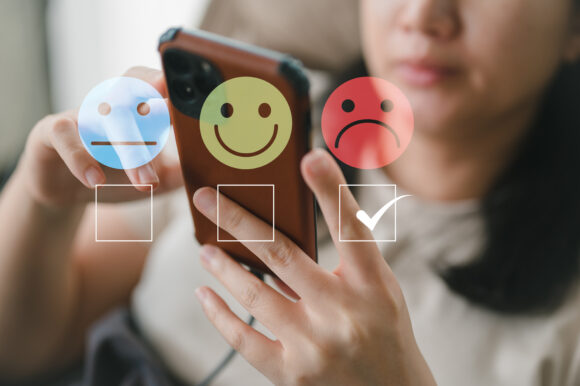Citing research showing increased rates of depression, anxiety, suicidal ideation, and self-harm associated with children and young adults’ social media use, officials in New York are proposing legislation to protect children from addictive platforms and sharing of their personal information.
The two bills, both sponsored by State Senator Andrew Gounardes and Assemblymember Nily Rozic, would prohibit online platforms from collecting and sharing personal data of children and young adults without consent and force the firms to limit addictive features of their social media platforms that may harm kids’ mental health and development.
“Our kids are in crisis, and the adults in the room need to step up. The statistics are extraordinarily disturbing: teen suicide rates are spiking, and diagnoses of anxiety and depression are surging,” said Governor Kathy Hochul in endorsing the measures.
Both measures authorize the state attorney general to enforce the law and seek damages or civil penalties of up to $5,000 per violation. They also authorize the parents/guardians of minors to seek damages of up to $5,000 per user per incident, or actual damages, whichever is greater. Online sites would be provided an opportunity to cure any claim brought by a parent/guardian of a minor.
One bill, the SAFE for Kids Act, addresses platforms including Facebook/Meta, Instagram, TikTok, Twitter, and YouTube that supplement the content that users view from the accounts they follow with content from accounts they do not follow or subscribe to. Sponsors say these algorithmic feeds have been shown to be addictive because they prioritize content that keeps users on the platform longer.
To address this problem, this legislation would provide users under 18 with a default chronological feed from users they already follow. It would also allow parents to opt out of access to social media platforms for minors between the hours of 12:00 a.m. and 6:00 a.m. and limit the total number of hours per day that a minor spends on platforms.
The second bill, the Child Data Protection Act, would prohibit all online sites from collecting, using, sharing, or selling personal data of anyone under the age of 18 for the purposes of advertising, unless they receive informed consent or unless doing so is strictly necessary for the purpose of the website. For users under 13, this informed consent must come from a parent.
“My daughter’s life was irrevocably changed at the hands of social media companies, who pushed harmful eating disorder, self-harm, and suicide-related content to her from the time she was 11-years-old,” said Kathleen Spence, a middle school teacher.
The U.S. Surgeon General, Dr. Vivek Murthy, has issued an advisory noting that while the effects of social media on adolescent mental health are not fully understood, there are “ample indicators that social media can also have a profound risk of harm to the mental health and well-being of children and adolescents.”
Media Entrepreneur Wants to Unite Young Activists with Power Brokers to Make Social Media Safe
Technology firms have been under fire from politicians from both parties in states and in Congress. They are also facing lawsuits.
The firms have said they have limited the types of content teens receive and promoted tools for parents to use but they warn against measures that go too far and restrict first amendment rights. In the summer, Meta, which owns facebook and Instagram, announced it would add some new parental tools and privacy features to its platforms. TikTok has added a time-sensitive passcode requirement for teens.
Some technology organizations have challenged protective laws in California, Utah, Arkansas, Texas and Florida.
NetChoice is one group fighting these state laws on social media. “It’s unfortunate for New Yorkers that the state is denying parents their right to raise their children as they deem appropriate, all while ignoring the simple steps of working with schools and community leaders to educate students and adults how to use social media in a safe and responsible manner,” Carl Szabo, NetChoice vice president and general counsel, said in a statement. “Instead of adopting the successful approach of Virginia and Florida to educate students, New York is following the same unconstitutional approach as California and Arkansas.”
NetChoice advocates more law enforcement authority and more education about social media for children and parents.
The issue is playing out in courtrooms. Meta faces hundreds of lawsuits from families of children claiming to suffer mental health problems by becoming addicted to Facebook and Instagram. Some school districts have also sued. Seattle Public Schools have sued TikTok, Instagram, Facebook, YouTube and Snapchat, for allegedly creating a public nuisance by targeting children. TikTok Inc. was sued over the death of a 10-year-old Pennsylvania girl who allegedly participated in an online challenge in which people choke themselves until they black out.
Topics New York
Was this article valuable?
Here are more articles you may enjoy.



 Judge Awards Applied Systems Preliminary Injunction Against Comulate
Judge Awards Applied Systems Preliminary Injunction Against Comulate  Insurance Issue Leaves Some Players Off World Baseball Classic Rosters
Insurance Issue Leaves Some Players Off World Baseball Classic Rosters  BMW Recalls Hundreds of Thousands of Cars Over Fire Risk
BMW Recalls Hundreds of Thousands of Cars Over Fire Risk  Munich Re Unit to Cut 1,000 Positions as AI Takes Over Jobs
Munich Re Unit to Cut 1,000 Positions as AI Takes Over Jobs 

